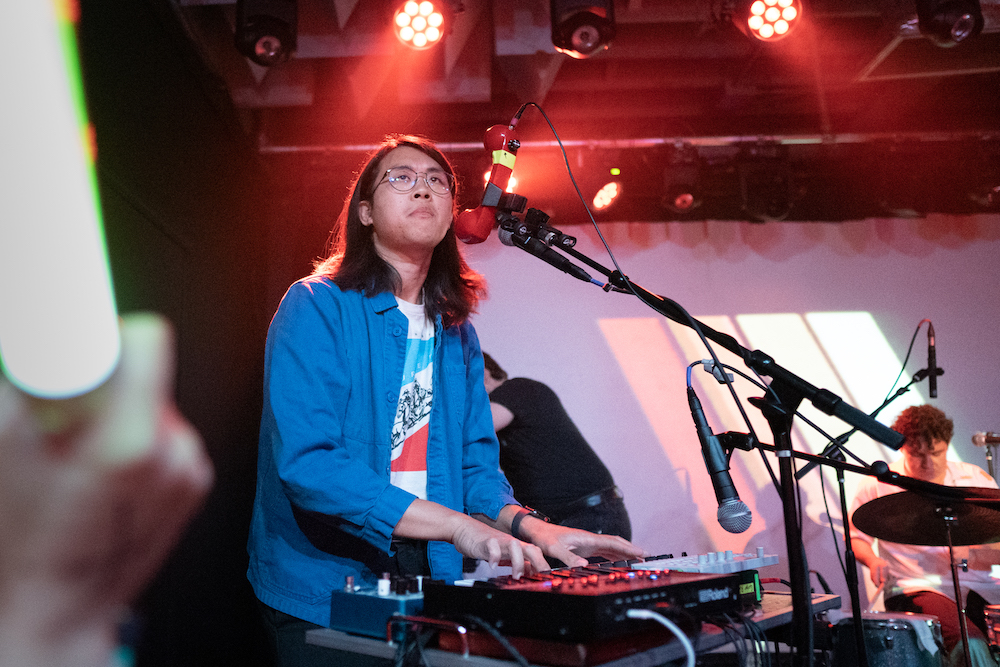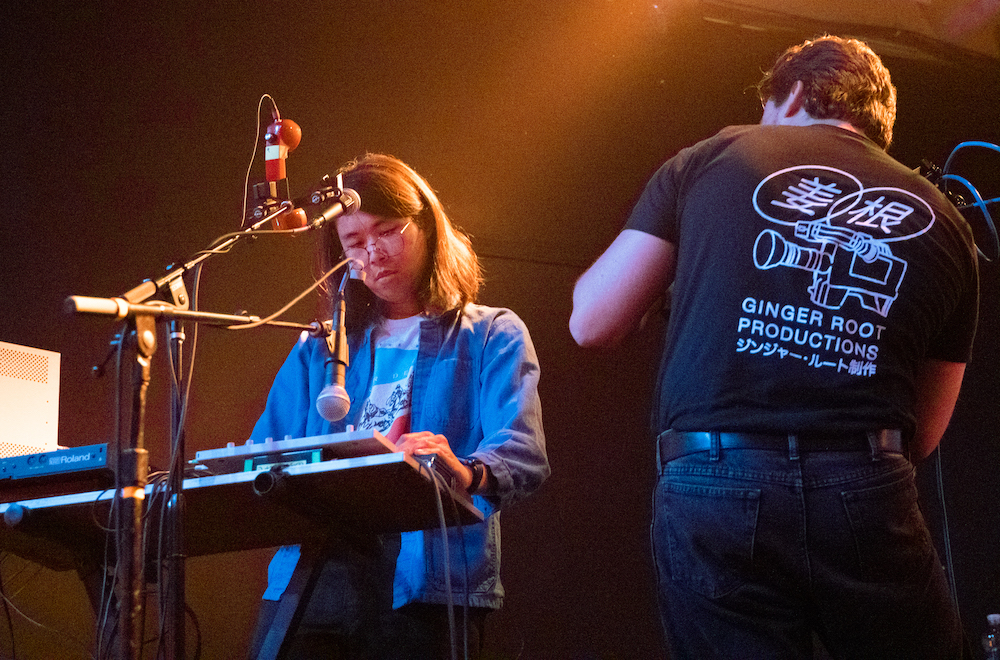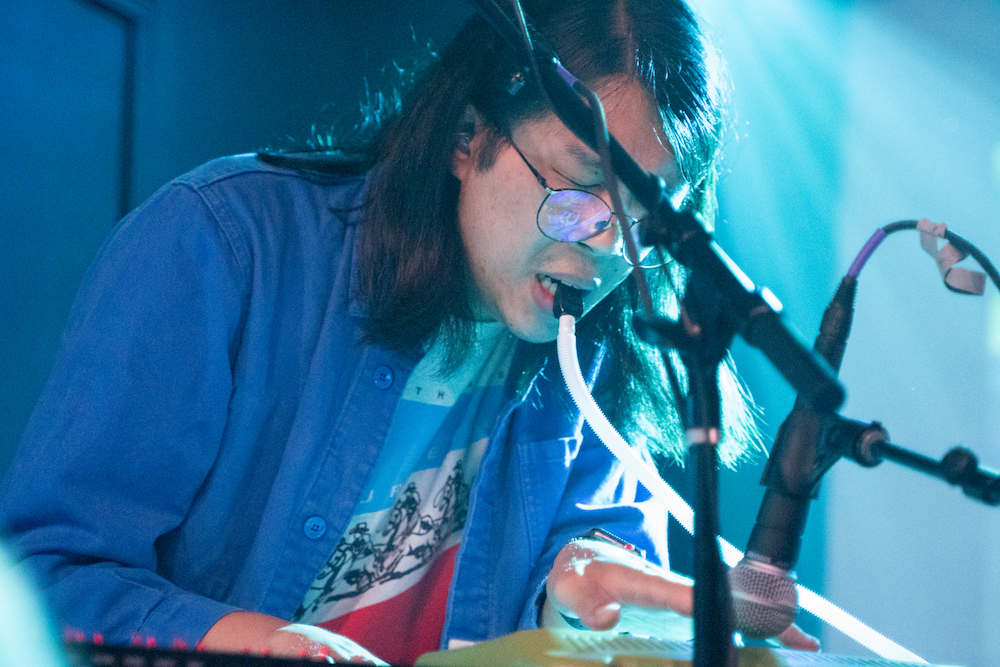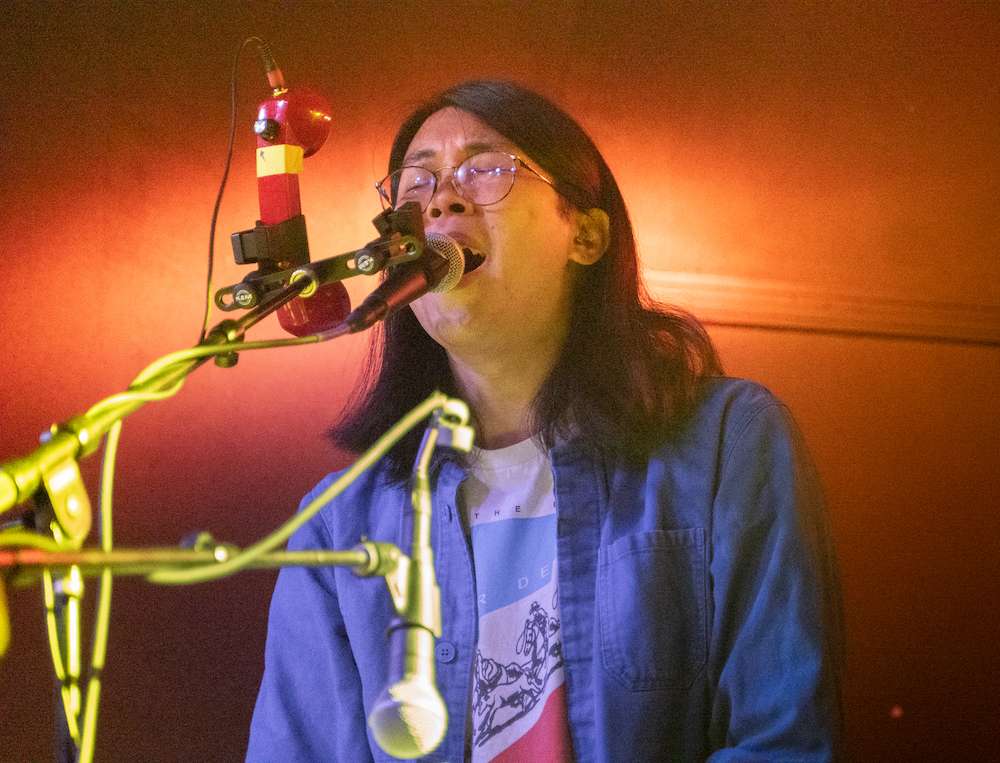Culture

Rising indie rock outfit Ginger Root dazzles Lakewood with brainy combo of Philly Soul, Japanese City Pop, and good old fashioned AOR
By: Emily Votaw
Posted on:
LAKEWOOD, Ohio (WOUB) – Ginger root, the knobby aromatic rhizome, has been known to take the edge off nausea, soothe sore throats, and even significantly relieve achy joints. Ginger Root, the musical project fronted by Cameron Lew, has been known to excite both anime nerds and Prince fans alike, all while evoking nostalgia for a past too groovy to have ever existed – at least not in the current timeline.
The latter played Lakewood’s Mahall’s (13200 Madison Avenue) September 20 – and the band looked just as surprised as any one else that a bowling alley on an otherwise non-descript Tuesday night in Northeast Ohio could erupt in such excitement over the might of the very large sound made by only three guys. It’s the sort of thing that’s just as improbable as someone (i.e. Cameron Lew) taking what could have been described as a “bedroom pop” project and expanding it to the point that it’s on the verge of becoming a whole universe – or perhaps more accurately, a series of universes.

Lucky for us, Lew was just getting started. The EP would be the aesthetic seed for the particularly funky hybrid of Japanese city pop, AOR, and Philadelphia Soul that Lew has cultivated over the past half decade in a series of increasingly accomplished releases. Most recent of these is “Nisemono,” a “concept EP” of sorts released earlier this month. The concept is this: it’s 1983 and the Japanese idol Ginger Root has been enlisted to write music for, Kimiko Takeguchi, has called it quits. Worse yet, she threw in the towel directly before what was supposed to be her American television debut! Like a kind of Paul Williams character – Ginger Root is left to perform the songs he wrote for someone else to sing.
I’ll leave it to you, dear reader, to give the EP (the title of which, translated from Japanese to English, is something along the lines of “fake” or “counterfeit”) a fair listen so you can hear for yourself how this all shakes out – but needless to say, the whole thing took a lot of imagination, and perhaps even more of what you might call “chutzpah” to pull off – but pull it off Lew so seamlessly does.
Lew, accompanied simply by rhythm section and high school buddies Matt Carney on drums and Dylan Hovis on bass, managed to bring a loving interpretation of that same sort of Japanese ‘80s nostalgic sensibility to just about every aspect of their Lakewood set. And it wasn’t just the music that called to mind the Japanese “bubble era,” – the visual aspect did, too. Dressed smart in an electric blue blazer and a pearly white button down, Lew utilized a suitably eclectic set up, often crunchifying and condensing his vocals with a retro phone receiver turned microphone. Longtime Ginger Root collaborator David Gutel prowled the small Mahall’s stage with a lunky television camera, broadcasting an ultra close up to the projector on the lefthand side of the room.

About halfway through the set, Lew and “the boys” (as they will henceforth be referred to – mostly because Carney and Hovis bear an uncanny resemblance to Brian and Carl Wilson) drew again from “City Slicker,” this time breaking out into “Juban District.” At this moment, if you didn’t already know that none other than Sailor Moon and her Sailor Soldiers happen to hail from the Juban District – you were about to learn. Suddenly the audience members dressed in schoolgirl outfits started to make sense. Beyond it being a timeless fashion statement – the short skirt, long socks, and sweater-tied-around-the-neck look happen to be the preferred style of dress when one finds themselves in a rock club and the rock band playing in the rock club seamlessly transforms their reverb-drenched, synth driven grooves to a medley of various anime theme songs.

These weren’t the only covers Lakewood was treated to. The anime medley experience was followed up with “Kimi ni, mune kyun,” the leading single from forever hip Japanese electronic pop group Yellow Magic Orchestra’s 1983 album “Naughty Boys.” Worth noting: Lew also covered the track during his appearance earlier this year on ALFA Music’s YouTube series, “My Favorite ALFA.”
This music journalist, as many others, discovered Yellow Magic Orchestra much the same way many fans fell upon Ginger Root: thanks to a YouTube algorithm. For me, it was “Watering a Flower,” the music YMO founding member Haruomi Hosono wrote for Japanese retailer MUJI that was released in 1984. Inexplicably, the instrumental album found its way to the top of my suggested videos again and again until I finally gave it a listen – upon which I was both intrigued and hooked.

After closing out their first set with the catchy rhythmics of “Weather,” our boys scampered performatively off stage for just a bit – before almost immediately giving into the clamoring audience and scampering right back on stage for a two song encore, consisting of “Ohio” (so appropriate!) off 2018’s “Majong Room,” and a cover of Kaoru Akimoto’s 1986 R&B/pop track “Dress Down.”


